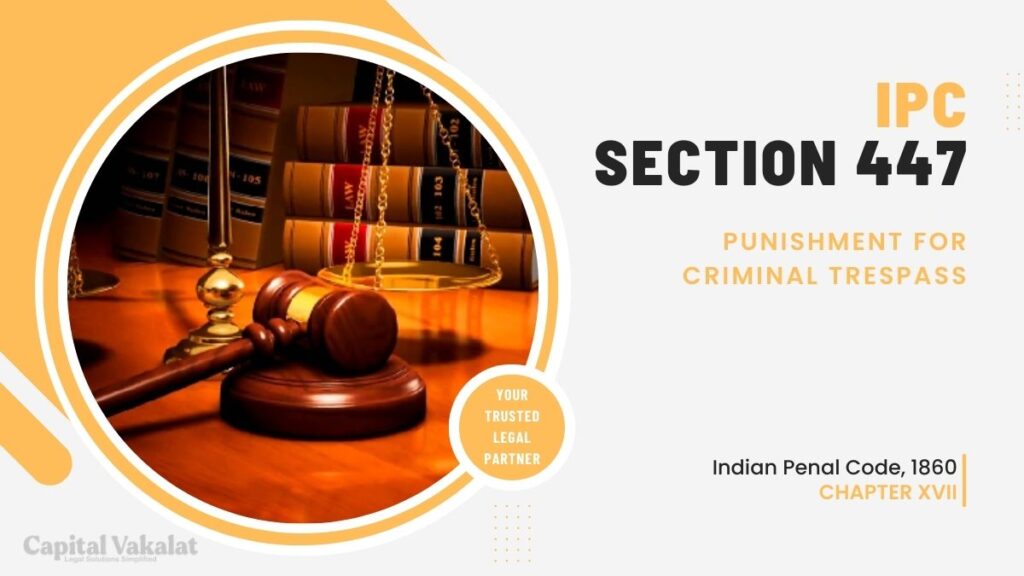In the vast landscape of legal frameworks, Section 447 IPC holds a crucial position, defining and penalizing criminal trespass.

As we delve into the nuances of this section, it becomes apparent that understanding criminal trespass is not only essential for legal professionals but for every citizen concerned with property rights and the preservation of law and order.
Understanding Criminal Trespass
Criminal trespass, as stipulated in Section 447 IPC, involves unlawfully entering or remaining on another person’s property without permission. The section encompasses various scenarios, from unauthorized entry into someone’s home to encroachment on land or premises. To comprehend the implications fully, it’s imperative to dissect the elements that constitute criminal trespass and explore the diverse situations that fall under its purview.
Legal Consequences of Criminal Trespass
Section 447 IPC outlines the legal repercussions for those found guilty of criminal trespass. Offenders may face imprisonment and/or fines, depending on the severity of the trespass. This section acts as a deterrent, emphasizing the gravity of invading someone’s property and infringing upon their rights.
Circumstances Aggravating Criminal Trespass
While the standard consequences are defined, certain aggravating factors can elevate the punishment. This may include instances where trespass is committed with the intent to cause harm or if the property trespassed upon holds significant value. Real-life examples serve as poignant illustrations of how aggravating circumstances impact the severity of punishment meted out by the legal system.
Comparative Analysis with Other Sections
To gain a comprehensive understanding, it’s crucial to differentiate Section 447 IPC from related legal provisions. By highlighting the nuances and distinctions, we can appreciate the specificities of criminal trespass and its unique place within the legal framework.
Landmark Cases and Precedents
Examining landmark cases and legal precedents involving Section 447 IPC provides insights into the evolving interpretation of this law. Courts often rely on past judgments to guide their decisions, shaping the trajectory of legal discourse surrounding criminal trespass.
Protecting Property Rights: Legal Perspectives
This section explores the intersection of criminal trespass and property rights. Property owners are armed with legal remedies to safeguard their assets, emphasizing the reciprocal relationship between individual rights and societal order.
Challenges in Enforcing Section 447 IPC
Enforcing Section 447 IPC poses inherent challenges, ranging from evidentiary issues to complexities in proving intent. Identifying these challenges is the first step toward proposing viable solutions and advocating for legal reforms that enhance the effectiveness of the law.
Awareness and Prevention Strategies
A society well-informed about criminal trespass laws is better equipped to prevent such incidents. By promoting awareness and implementing preventative strategies, communities can contribute to a safer environment, reducing the occurrence of trespass-related offenses.
Conclusion
In conclusion, Section 447 IPC plays a pivotal role in upholding property rights and maintaining order in society. As we navigate the intricate landscape of criminal trespass, it becomes evident that a nuanced understanding of the law is essential for both individuals and legal practitioners. By continuously evaluating and adapting legal frameworks, we can ensure that justice is served effectively.
Frequently Asked Questions
Are there different levels of punishment for criminal trespass?
Yes, the punishment varies based on the severity of the trespass, with imprisonment and/or fines as potential consequences.
Can aggravating circumstances enhance the punishment for criminal trespass?
Yes, factors like intent to cause harm or trespassing on high-value property can lead to an escalation of punishment.
How do legal precedents influence the interpretation of Section 447 IPC?
Legal precedents provide a framework for courts to interpret and apply Section 447 IPC in current cases.
What preventative measures can individuals take to avoid criminal trespass incidents?
Individuals can enhance security measures, promote community awareness, and collaborate with law enforcement to prevent trespass incidents.